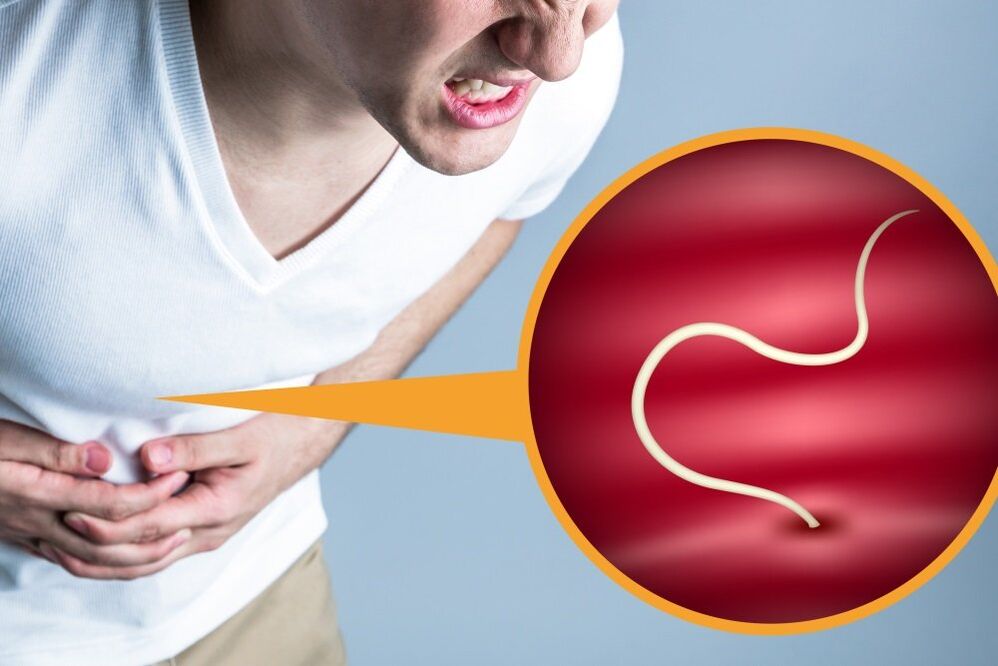A person throughout his life is now and then attacked by all kinds of microbes, fungi, as well as different types of parasites. The latter are able to penetrate into all organs of the body, thereby causing many problems to the infected.
Read about the prevention of helminthic invasions and the timely detection of parasites in the article.
Types of parasites in the body

In total, there are three types of parasites: roundworms, tapeworms and flukes (all of them are equally dangerous to humans).
- The most famous worms are the inhabitants of the intestines. Roundworms and pinworms enter the body with poorly washed vegetables and fruits, most often they come out naturally. In rare cases, they cause severe complications such as liver abscess, peritonitis or intestinal perforation. If you have a dog in the house, you can get a tapeworm by swallowing a dog flea.
- Lovers of caviar, raw or slightly salted fish are trapped by an infection called opisthorchiasis. If a large number of worms have entered the body, then the disease quickly manifests itself in nausea, vomiting and fever. But when there are few parasites, the disease proceeds slowly, which sometimes leads to the development of cancer of the gallbladder or bile ducts. One of the symptoms of opisthorchiasis is intolerance to fatty foods.
- The types of parasites that live in wild animals often settle in the liver. For example, contaminated feces of raccoons, foxes or badgers got on forest berries or in a stream, and if a person drinks such water or eats berries, he may contract alveococcosis (a type of echinococcosis). The parasite, like a cancerous tumor, is able to grow into the liver, and in the later stages of a person it is not always possible to save it.
- Trichinosis, or "hunter's disease", can be contracted through meat, including venison and bear meat. The disease can be recognized by a high temperature for several weeks, rashes on the body, muscle pain, swelling of the face. Trichinosis larvae are not afraid of freezing, salting, as well as conventional heat treatment (frying, cooking). Therefore, the meat of wild animals can be consumed only if it bears the stamp of the veterinary inspection.
- Some types of parasites penetrate the holy of holies - the human brain. Echinococcus and cysticercus are especially famous for this, it is also the larva of the pork tapeworm, which can be infected by contact with a sick person or eating pork meat with blood or fat with veins of meat. Pork tapeworm usually likes to settle in the intestines, but its larvae enter the bloodstream, and through it into the eyes and brain. Therefore, any meat must be thermally processed very carefully and for a long time.
Echinococcus parasite: how not to get infected
Echinococcosis is one of the most dangerous diseases, and it is diagnosed when it is infected with tapeworms of the genus Echinococcus. The parasite is dangerous in that it releases toxic substances to which the immune system responds with allergic reactions and symptoms of intoxication. Sometimes domestic dogs become the spread of infection, since particles of feces with eggs of echinococcus remain on the coat. But you can get infected by eating unwashed vegetables, fruits, raw or poorly processed meat, milk and sour cream. In addition, reservoirs are also a source of infection.
In the infected organism, the so-called cysts grow in the form of bubbles: their size can reach 20 cm in diameter. Their danger is that they can rupture or go into the stage of an abscess with purulent contents. Both are fraught with ingestion of the contents of the cyst into the abdominal cavity, which will lead to anaphylactic shock or peritonitis.
When the cysts grow, they seem to displace nearby organs and irritate their mucous membranes. Under their pressure, the organs are displaced, which causes a malfunction in their work.
The parasite easily travels through the body through the blood, so it can be found in different places: from the brain to the heart, liver or bones. Hence, the characteristic symptoms, for example, a feeling of shortness of breath with damage to the lungs, with localization in the liver there are signs of jaundice, and with the formation of a cyst in the brain, headaches occur.
In advanced cases, echinococcosis is treated surgically: cysts are removed (often with part of the affected organ). Then a long course of antiparasitic drugs is recommended.
Prevention of helminthic invasions

Parasitic infections are common. Thus, according to statistics from the World Health Organization, more than 4. 5 billion people on the planet are infected with helminthiasis. Symptoms of infection depend on the location and type of parasites, but there are a number of common signs that indicate helminthic infestation. So, anemia, local pains, disruptions in the digestive system are noted, allergic reactions occur, spots, acne, and rough areas appear on the skin. The patient's night regimen is disturbed, he snores, twitches convulsively. It is important to remember that helminthiasis does not always cause weight and appetite loss.
Prevention of helminthic infestations is based on competent processing of fish, meat, fruits and vegetables. It is best to boil meat products: beef and lamb for at least two hours. And the fish should be frozen at a temperature of -40 degrees, fried well and salted in a large amount of salt. All products should be closed or refrigerated to prevent flies from spreading (they and mosquitoes are carriers of worms).
Unverified bodies of water, especially if there are waterfowl, should be avoided and not bathed in them.
It is recommended to regularly treat pets for helminthiasis, feed only cooked food or dry food.
Prevention of infections also includes annual medical examination, which includes fluorography. If you suspect helminthiasis, you can do an ultrasound of the abdominal cavity and take a general blood test with a leukocyte formula, in which the eosinophil indicator is important.
If you are concerned about the above symptoms, this is a reason to see a doctor. Self-medication will only harm, especially since anthelmintic drugs are very toxic and they need to be selected for a specific parasite. Folk remedies have become a great help in treatment, among which garlic, a decoction of dry wormwood, an infusion of tansy and buckthorn are in the lead.

















